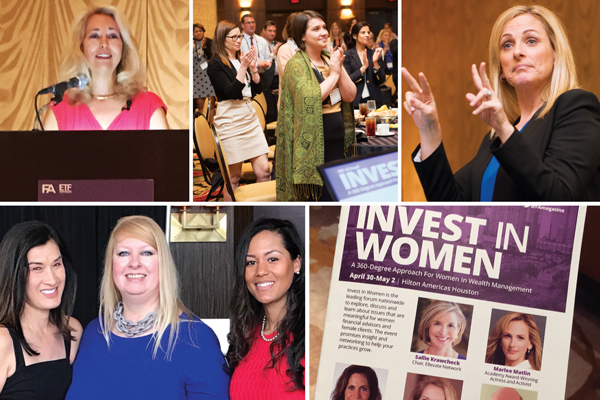
The financial industry is at the bottom of the pile when it comes to accepting, promoting and serving women, says Sallie Krawcheck.
The Merrill Lynch veteran and entrepreneur discussed those setbacks to women with more than 300 attendees at last month’s Invest In Women conference in Houston. The conference was sponsored by Financial Advisor and ETF Advisor magazines.
Krawcheck, whose career arc has led her from equity analysis at Sanford C. Bernstein & Co. to the top spot at Merrill Lynch Wealth Management, has recently made a new mark as co-founder and CEO of Ellevest, a New York City-based digital investing platform for women. As one of the featured speakers at the three-day Invest In Women conference, she didn’t mince her words about the progress—or lack thereof—women have made within the industry.
The gender pay gap is closing, she said, but only very slowly. At the rate society is moving, she said, it will take women 38 years to reach pay equity; black women will need 110 years and Hispanic women 180 years.
She believes the problem will not change until women attack it as a group. “We cannot do it as individuals,” she said. “We have to do it together.”
Once women unite and demand to be included, the changes will have to come from the CEOs and top leaders in financial services, she said. When she worked for the big-name firms, she said she tried to get the top management to embrace women and the different sensibilities and ideas they bring to the table. But her proposals fell on deaf ears, and that’s why she started her own firm.
Other keynoters at the event included actress Marlee Matlin, former CIA agent Valerie Plame, Ben & Jerry’s founder Jerry Greenfield, advisor Carolyn McClanahan and elder justice advocate Philip Marshall.
While increasing the number of women advisors and serving female clients were major themes of the event, various panel sessions dealt with the nuts-and-bolts issues of running a financial planning—as well as life planning—practice.
During a panel discussion, a couple of business coaches explained how financial advisors can define their strengths to advance their careers. “You need clarity about what you bring to the table” in order to advance in a firm or to move your own firm forward, said Barbara Stewart, founder of Accelus Partners, a coaching firm based in Houston. One way to start learning what your particular talents are is to take the CliftonStrengths assessment, which will identify your top five strengths, she said.
In another session, Betsy Brill, co-founder of Strategic Philanthropy in Chicago, said advisors need to help clients think about philanthropy and define their goals, but they should also provide their clients with the information they need to help carry out their wishes.
Jennifer Klein Strauss, an attorney with the Houston-based law firm Ytterberg Deery Knull who appeared on the panel with Brill, noted that evolving tax codes mean it’s incumbent on advisors to keep up with the latest rules on charitable giving. Those include the sunset dates on which some of the tax and estate law changes made in the recent reform will revert back to pre-2018 law.
One of the sessions focused on a couple of issues that are germane to the younger breed of financial planners—serving younger clients and operating their businesses in a newfangled way that suits them. “What I’ve noticed in the industry is that [the] sentiment is kind of like, ‘We don’t really want to get involved with the younger generation—they don’t have money,’” said Heather Townsend, who runs her practice from Kirkland, Wash. Her take is that advisors should want to on-board their clients’ children, especially if those children stand to inherit their parents’ wealth.
Townsend runs a virtual practice that works with clients in their 20s and 40s across the U.S. “Millennials want to leave this corporate 9 to 5; they want to be free and they want to travel,” she said.
She and other panelists—Helen Ngo, CEO of Capital Benchmark Partners and Made Modern Money in Atlanta, and Winnie Sun, the co-founder and managing director of Sun Group Wealth Partners in Irvine, Calif.—said social media is their marketing tool of choice. Townsend noted she doesn’t have official social media accounts, but she doesn’t mind clients following her personal Instagram account.
All three said their practices are practically all-digital, because their clients communicate, make payments and arrange their lives through online platforms. Sun’s phone barely rings anymore, she said, since clients have the option of reaching out to her on whatever social media platform they feel comfortable with.
But more accessibility doesn’t necessarily mean frequent direct communication, said Ngo. She uses the virtual assistant application Schedule Once to set parameters around her schedule. Sun said chat bots are a way to handle minor things such as frequently asked questions.